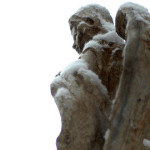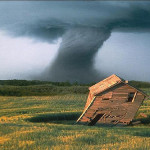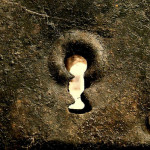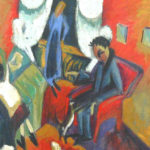We run our website the way we wished the whole internet worked: we provide high quality original content with no ads. We are funded solely by your direct support. Please consider supporting this project.

The Nature of Human Rebellion
God placed Adam in the Garden and instructed him to “protect” it (Gen. 2:15). The word is often translated “till” or “keep,” implying that Adam’s main responsibility was to protect the pristine Garden from weeds. This is certainly a possible interpretation of this word, but in light of the cunning serpent that shows up in the very next chapter, we suspect Adam was supposed to protect the Garden from something much worse than weeds. Besides, the narrative suggests that things like weeds didn’t appear in the Garden until after the rebellion.
The serpent is described simply as the most cunning beast that God made (Gen. 3:1). However, in ancient near eastern culture, the serpent was often a symbol of evil. New Testament authors as well as most theologians in the early church assumed that the serpent was either an animal-incarnation or a symbolic representation of Satan. Whatever aspects of this story we interpret literally or figuratively (the church has never insisted on one way of interpreting this story), it seems very clear that Satan was seeking to co-opt our primordial parents into his rebellion— and, tragically, it worked.
Out of love, God had placed two trees in the middle of the Garden. One was the “Tree of Life” and the other was “The Tree of the Knowledge of Good and Evil.” The first represents God’s provision of everlasting life with him while the second represents God’s “No Trespassing” sign. The two trees were God’s loving way of reminding the first couple that the beautiful life God intended for humans revolved around their trusting him as their source for life, while honoring the boundary between them and God. God alone is final judge of the world, and, for us to be like God in how we love, we must refrain from trying to be like God in how we judge.
The way the serpent deceived Eve—and continues deceive people today—was by convincing her that God was not altogether good. This is the way rebellion against God works. Satan convinced Eve that God did not have her and Adam’s best interest at heart when he forbade them to eat from the mysterious tree. Indeed, the serpent actually suggested that God had acquired his own omniscience by eating from this tree and that God’s motive for forbidding Eve to eat from it was that he didn’t want any competition (Gen. 3:5). If Eve would violate this “No Trespassing” sign, the serpent suggested, she could improve her lot in life and be “like God, knowing good and evil.”
The moment Eve accepted this pathetic picture of God, she no longer trusted her Creator to be her sole source of life. When she looked at the tree through the lens of her newly acquired false picture of God, the poisonous fruit of the forbidden tree seemed “good for food,” “pleasuring to the eye,” and “desirable for gaining wisdom” (Gen. 3:6). As Eve’s fallen descendants, the same thing happens to us. Whenever we’re not trusting God and getting our sense of fullness of life from him, we look at the world with hungry eyes and things that otherwise would not seem “eatable” begin to look delicious. If our souls were satisfied with the fullness of life our Father longs to pour into us, we would never suspect that things like power, pleasures, possessions, fame, knowledge, or disobeying God in any way could be a way to acquire our ultimate worth, significance or security. These things take on an appealing appearance only because we view them through hungry eyes.
Under the delusion of her demonically-inspired false picture of God, Eve rebelled against God and tried to acquire life for herself by eating from the forbidden Tree. Adam then followed suit, and God’s beautiful plan for humans was derailed. The same continues today. What lies about God have tempted you to question God’s goodness? What sources outside of God are you trying to use to fill yourself up with life?
—adapted from an unpublished manuscript.
Category: General
Tags: Satan, Sin, Spiritual Warfare
Related Reading

4 Reasons to Wake Up to the Warfare Worldview
Image by postbear via Flickr A view of the world that grounds the problem of evil in spiritual warfare is not one that many modern people find easy to accept. To many contemporaries, the notion is preposterous that real, semi-autonomous, self-determining, and invisible spirits exist that can and do influence our lives. The whole thing sounds…

“Natural” Evil? 7 Arguments Implicating Satan
Image by Jmos® via Flickr We believe that God is the Creator of nature, but nature simply does not seem to point to a God of love. Parasites, viruses, bacteria, diseases and cancer kill millions and torment millions more, humans and animals alike. Earthquakes, hurricanes, tsunamis, mudslides and volcanoes do the same. Theists have traditionally argued that…

What Are the “Keys to the Kingdom”?
And I tell you that you are Peter [petros = rock], and on this rock I will build my church, and the gates of Hades will not overcome it. I will give you the keys of the kingdom of heaven; whatever you bind on earth will be bound in heaven, and whatever you loose on…

Love Conquers All
Paul prayed in this way for the church at Ephesus: I pray that, according to the riches of his glory, [God] may grant that you may be strengthened in your inner being with power through his Spirit, and that Christ may dwell in your hearts through faith, as you are being rooted and grounded in…

What does the Bible mean when it says God “sent an evil spirit” on certain people?
Question: In Judges 9:23, I Samuel 16:15ff and 18:10 it is said that God sends evil spirits on people. Doesn’t this support the idea that everything Satan and demons do is under God’s sovereign control? Answer: I’ll make six points in response to this question. 1) If everything Satan and demons do is under “God’s…

